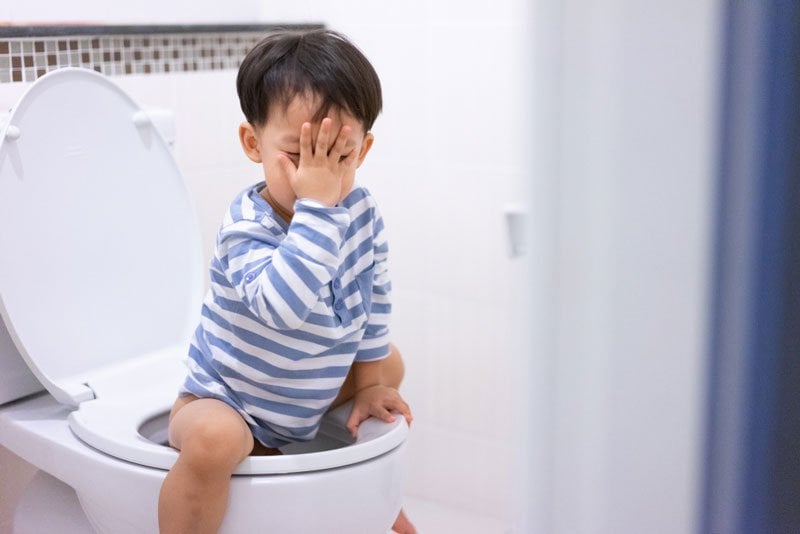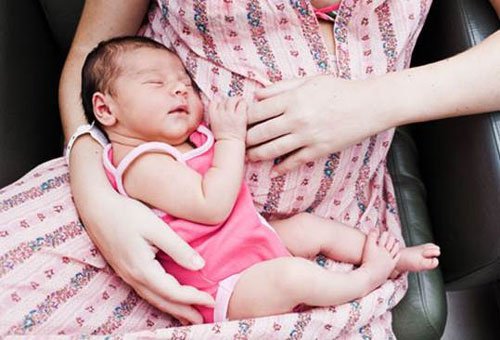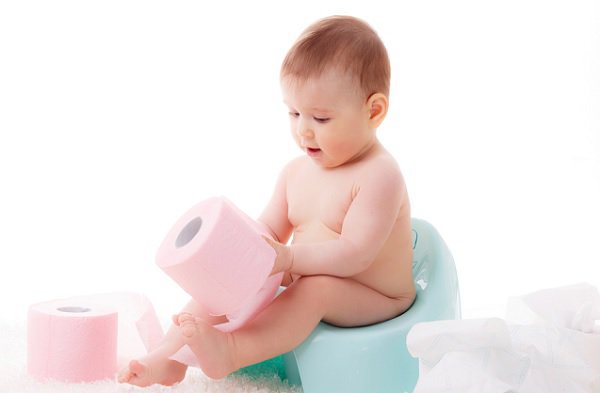Anal fissure after giving birth: The suffering of mothers
This is an automatically translated article.
The article was professionally consulted by Gastroenterologist, Department of Examination & Internal Medicine - Vinmec Hai Phong International General Hospital
Postpartum anal fissure is a common problem in mothers after labor. The disease affects many mothers both physically and mentally.
1. What is postpartum anal fissure?
Postpartum anal fissure is a painful tear in the lining of the anus that usually occurs after trying to pass hard stools.
Postpartum anal fissure symptoms include severe pain and burning sensation during and after defecation and bloody stools. Postpartum anal fissures are easy to mistake for hemorrhoids because both conditions can cause anal bleeding. However, they are two different problems.
The main cause of anal fissures after childbirth is due to sudden contractions during anal delivery, constipation. However, there is no clear cause behind this condition because in clinical practice many patients are not constipated. The cause of cracks or tears in the lining of the anus is mainly due to hard stools.
Postpartum anal fissure symptoms include severe pain and burning sensation during and after defecation and bloody stools. Postpartum anal fissures are easy to mistake for hemorrhoids because both conditions can cause anal bleeding. However, they are two different problems.
The main cause of anal fissures after childbirth is due to sudden contractions during anal delivery, constipation. However, there is no clear cause behind this condition because in clinical practice many patients are not constipated. The cause of cracks or tears in the lining of the anus is mainly due to hard stools.
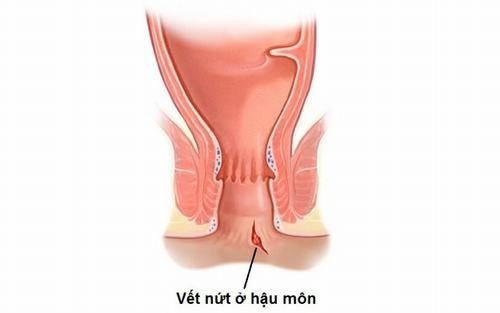
Quá trình sinh nở hậu môn bị co thắt đột ngột, táo bón gây nứt kẽ hậu môn
2. Anal fissure after birth what to do?
Treatment of anal fissures after childbirth has the following methods:
2.1. Non-surgical treatment This is the basic treatment applied to all postpartum anal fissures in order to eliminate pathogens and help increase blood flow to the damaged mucosa. This method can heal up to 90% of acute postpartum anal fissures.
Prevent constipation or soften stool to help eliminate pathogens. Patients must drink a lot of water (more than 2 liters / day) and increase the fiber in the meal: such as vegetables, beans, fruits, ... Drinking a lot of water is important because water makes stools soft so it cannot cause diarrhea. damage the anus and also avoid recurrence.
In addition, the doctor may also prescribe some stool softeners to reduce pain and bleeding. Soak the anus in warm water (40 degrees Celsius) for 10-20 minutes, 3-4 times a day, to help relax the sphincter, increase blood flow, relieve pain and make postpartum anal fissure patients more comfortable. You can apply heat to the anal area, but be careful not to burn the skin.
The doctor can prescribe some topical ointments of the nitroglycerin group or calcium channel blocker to help relax the internal sphincter and increase perfusion of the fissure area, this therapy can help heal the disease with a rate of 65% - 90%.
However, the side effects of the above drug such as headache, hot flushes, low blood pressure ... make patients with postpartum anal fissure can not continue with the treatment dose lasting many weeks. Another method is also applied is injecting Botox toxin into the inner sphincter, causing relaxation of the sphincter in about 2-3 months, chronic cracks can heal in 60-80% of cases, the cost of Botox injections is very high. and also recurrent.
When the above lifestyle modifications and treatments still fail to heal, an acute postpartum anal fissure can turn chronic. At this time, it is necessary to identify other causes of postpartum anal fissure such as infection, anal examination under anesthesia or anesthesia, and internal sphincter tone measurement to determine hypertonia. Surgery is the last resort for the treatment of chronic postpartum anal fissures that have not responded to conservative treatment.
2.2. Surgical treatment Medical treatment has advantages such as being able to repeat many times, combining many drug groups together to increase effectiveness, with few complications. Although surgery may be considered the gold standard, it is preferable to conservative medical treatment because of the risk of fecal incontinence (5-15%).
The simple surgery is to cut a part of the sphincter in the anal canal (done under anaesthesia) to relieve pain, relax the muscles and heal the incision. Patients with postpartum anal fissures can be discharged from the hospital the next day, relieve pain after surgery for a few days, and completely heal after a few weeks. The success rate of surgery is up to 90%. Failure or recurrence may be due to insufficient sphincterotomy, in which case reoperation can be performed by resection of the other side. If too many sphincters are cut, there is a risk of losing bowel control.
2.1. Non-surgical treatment This is the basic treatment applied to all postpartum anal fissures in order to eliminate pathogens and help increase blood flow to the damaged mucosa. This method can heal up to 90% of acute postpartum anal fissures.
Prevent constipation or soften stool to help eliminate pathogens. Patients must drink a lot of water (more than 2 liters / day) and increase the fiber in the meal: such as vegetables, beans, fruits, ... Drinking a lot of water is important because water makes stools soft so it cannot cause diarrhea. damage the anus and also avoid recurrence.
In addition, the doctor may also prescribe some stool softeners to reduce pain and bleeding. Soak the anus in warm water (40 degrees Celsius) for 10-20 minutes, 3-4 times a day, to help relax the sphincter, increase blood flow, relieve pain and make postpartum anal fissure patients more comfortable. You can apply heat to the anal area, but be careful not to burn the skin.
The doctor can prescribe some topical ointments of the nitroglycerin group or calcium channel blocker to help relax the internal sphincter and increase perfusion of the fissure area, this therapy can help heal the disease with a rate of 65% - 90%.
However, the side effects of the above drug such as headache, hot flushes, low blood pressure ... make patients with postpartum anal fissure can not continue with the treatment dose lasting many weeks. Another method is also applied is injecting Botox toxin into the inner sphincter, causing relaxation of the sphincter in about 2-3 months, chronic cracks can heal in 60-80% of cases, the cost of Botox injections is very high. and also recurrent.
When the above lifestyle modifications and treatments still fail to heal, an acute postpartum anal fissure can turn chronic. At this time, it is necessary to identify other causes of postpartum anal fissure such as infection, anal examination under anesthesia or anesthesia, and internal sphincter tone measurement to determine hypertonia. Surgery is the last resort for the treatment of chronic postpartum anal fissures that have not responded to conservative treatment.
2.2. Surgical treatment Medical treatment has advantages such as being able to repeat many times, combining many drug groups together to increase effectiveness, with few complications. Although surgery may be considered the gold standard, it is preferable to conservative medical treatment because of the risk of fecal incontinence (5-15%).
The simple surgery is to cut a part of the sphincter in the anal canal (done under anaesthesia) to relieve pain, relax the muscles and heal the incision. Patients with postpartum anal fissures can be discharged from the hospital the next day, relieve pain after surgery for a few days, and completely heal after a few weeks. The success rate of surgery is up to 90%. Failure or recurrence may be due to insufficient sphincterotomy, in which case reoperation can be performed by resection of the other side. If too many sphincters are cut, there is a risk of losing bowel control.
3. Anal fissure should eat what?
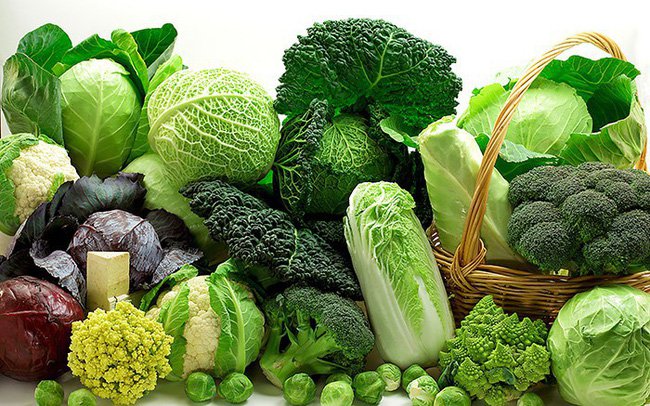
Thực phẩm giàu chất xơ giúp cải thiện tình trạng bệnh
Foods containing fiber: Fiber has the effect of promoting the digestive system, softening the stools, and the effect of breaking down waste products in the body so that they are easier to be expelled. As a result, it can prevent constipation very well for patients with anal fissures after childbirth. Mothers need to eat a lot of green vegetables such as spinach, amaranth, cruciferous vegetables ... these are vegetables that contain a lot of fiber to improve the disease. Drink plenty of water: Drinking plenty of water will help digestion, soften stools and limit constipation, avoid anal fissures after childbirth. Drinking enough 2 liters of water a day will help to purify the body, the digestive organs work better, easy to digest, soft stools, avoid constipation. In addition, mothers can use accompanying fruit juices such as: orange juice, avocado, almond, ... Fruit juice contains a lot of vitamins and minerals to provide an abundant source of energy for the body and stimulate the taste buds, create a sense of appetite.
Laxative foods: To effectively treat postpartum anal fissures without recurrence, the patient needs to overcome this condition first. Mothers should eat laxative foods that stimulate the digestive system to work well to prevent constipation effectively. Some laxative foods need to be added to the meal: Sweet potatoes, potatoes, pumpkin, spinach, amaranth, papaya, black sesame,... Foods rich in iron: When cracked after After giving birth with bleeding manifestations, the patient is at risk of blood loss and anemia. Therefore, in the diet, it is necessary to add foods that contain a lot of iron such as: Amaranth, chicken liver, nuts containing a lot of oil (peanuts, sesame, walnuts, almonds...) Aloe vera: known as a good heat-clearing herb not only has beauty benefits but also cures many diseases. Aloe vera has high antibacterial and anti-inflammatory properties, so it has a very effective pain reliever and anti-inflammatory effect. Postpartum mothers just need to separate the aloe vera gel and apply it around the anal area 3 times a day, regularly for 1 month, the anal fissures after childbirth will heal. In addition, aloe vera has cool properties, clearing heat and detoxifying the body, so you can combine it with daily dishes to prevent constipation and bleeding.
Olive oil is a natural essential oil, contains many useful fats, helps lubricate the intestinal system, so it has an effective prevention of constipation. Moreover, with anti-inflammatory and moisturizing properties, olive oil helps fight anal infections very well and heals wounds quickly, preventing anal fissures after birth. How to use olive oil to treat postpartum anal fissures is as follows: take a tablespoon of olive oil, combine with a tablespoon of honey and a tablespoon of beeswax, mix well, then boil. After the mixture cools, apply it on the cracks. Do this regularly every day, the crack will heal. Besides, olive oil can be used to replace cooking oil daily to prepare dishes, which will improve the digestive system, overcome constipation, and prevent anal fissures after childbirth.
Coconut oil: In coconut oil contains active ingredients triglycerides, so when applied to the anus, it will help lubricate the anus to reduce pain when defecating. In addition, in coconut oil also contains antibacterial substances that will reduce the inflammation of the anal fissures after childbirth. This way should be done in the evening, before going is best. Tamanu oil: Tamanu essential oil is a natural essential oil, which has analgesic, anti-inflammatory, scar-healing, and wound-healing effects. Use a cotton ball to absorb this solution, then apply it to the wound. This method is done twice a day, after 1 month the cracks will heal and help reduce anal fissures after birth. Before applying aloe vera, olive oil, coconut oil, tamanu oil to the wound, clean the anus properly and cleanly. Please wash the anus with warm water and dry it with a soft towel, to avoid damage to postpartum anal fissures.
The above treatments for anal fissures are only applied to people with mild anal fissures. For severe cases, patients should go to a reputable clinic for examination and treatment under the guidance of doctors.
Laxative foods: To effectively treat postpartum anal fissures without recurrence, the patient needs to overcome this condition first. Mothers should eat laxative foods that stimulate the digestive system to work well to prevent constipation effectively. Some laxative foods need to be added to the meal: Sweet potatoes, potatoes, pumpkin, spinach, amaranth, papaya, black sesame,... Foods rich in iron: When cracked after After giving birth with bleeding manifestations, the patient is at risk of blood loss and anemia. Therefore, in the diet, it is necessary to add foods that contain a lot of iron such as: Amaranth, chicken liver, nuts containing a lot of oil (peanuts, sesame, walnuts, almonds...) Aloe vera: known as a good heat-clearing herb not only has beauty benefits but also cures many diseases. Aloe vera has high antibacterial and anti-inflammatory properties, so it has a very effective pain reliever and anti-inflammatory effect. Postpartum mothers just need to separate the aloe vera gel and apply it around the anal area 3 times a day, regularly for 1 month, the anal fissures after childbirth will heal. In addition, aloe vera has cool properties, clearing heat and detoxifying the body, so you can combine it with daily dishes to prevent constipation and bleeding.
Olive oil is a natural essential oil, contains many useful fats, helps lubricate the intestinal system, so it has an effective prevention of constipation. Moreover, with anti-inflammatory and moisturizing properties, olive oil helps fight anal infections very well and heals wounds quickly, preventing anal fissures after birth. How to use olive oil to treat postpartum anal fissures is as follows: take a tablespoon of olive oil, combine with a tablespoon of honey and a tablespoon of beeswax, mix well, then boil. After the mixture cools, apply it on the cracks. Do this regularly every day, the crack will heal. Besides, olive oil can be used to replace cooking oil daily to prepare dishes, which will improve the digestive system, overcome constipation, and prevent anal fissures after childbirth.
Coconut oil: In coconut oil contains active ingredients triglycerides, so when applied to the anus, it will help lubricate the anus to reduce pain when defecating. In addition, in coconut oil also contains antibacterial substances that will reduce the inflammation of the anal fissures after childbirth. This way should be done in the evening, before going is best. Tamanu oil: Tamanu essential oil is a natural essential oil, which has analgesic, anti-inflammatory, scar-healing, and wound-healing effects. Use a cotton ball to absorb this solution, then apply it to the wound. This method is done twice a day, after 1 month the cracks will heal and help reduce anal fissures after birth. Before applying aloe vera, olive oil, coconut oil, tamanu oil to the wound, clean the anus properly and cleanly. Please wash the anus with warm water and dry it with a soft towel, to avoid damage to postpartum anal fissures.
The above treatments for anal fissures are only applied to people with mild anal fissures. For severe cases, patients should go to a reputable clinic for examination and treatment under the guidance of doctors.
This article is written for readers from Sài Gòn, Hà Nội, Hồ Chí Minh, Phú Quốc, Nha Trang, Hạ Long, Hải Phòng, Đà Nẵng.

